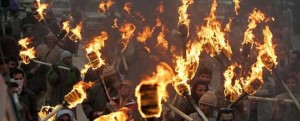 Article 370-A Challenge to the Indian Nation
Article 370-A Challenge to the Indian Nation
By Mahesh Kaul
There is no doubt that Article 370 of the Constitution of India has been the centre of debate
from time to time. It has been interpreted in a wrong manner, as if it is the cardinal
principle of the Constitutional and political status of Jammu & Kashmir. The analysis of
Article 370 has been based more on rhetoric and less on the actual nature of the Article.
Article 370 was temporary, and hence, the so-called ‘special status’ of Jammu & Kashmir was
also temporary. It was never meant to be permanent as understood by the forces who want to
take the State out of the political and Constitutional ambit of India. It is pertinent to
underline the provisions incorporated in Article 370 that empowered the President of India to:
» Transfer powers to the Union with regard to such other subjects in the Union list and the
Concurrent List of the 7th Schedule of the Indian Constitution, which the President specified
with the concurrence of the State Government.
» Extend to the State the provisions of the Constitution of India, which were to be applied to
the State with such modifications and expectations as the President would specify.
It becomes amply clear that there is nothing in the above mentioned points that makes the Act
sacrosanct. However, on studying Article 370 carefully, it becomes clear that there are no
limitations in terms of Amending it. Thus, technically speaking, there is no hurdle in
abrogating the Act if the sense of Parliament wants it to be so.
Article 370 has become an insulator that is insulating the Jammu & Kashmir State from the
national mainstream. The wrong interpretation of projecting this Article as the guarantor of a
‘State within the state’ is a falsification of the Constitutional reality. This canard — that
the Act is meant to keep the State away from the national mainstream — has helped fan Muslim
separatist tendencies in Jammu & Kashmir who term it in a very perverted sense and say that
the so-called special status was given to it to maintain its Muslim majority character. This
in itself is a deviation from the true meaning of this temporary Article which was supposed to
have been erased long back as its abrogation is very much inherent in its being.
The wrong interpretation of this Article has created many fault lines that are now staring the
nation in the face. It is a strange case in the Constitutional history of the India that a
very weak Article has been given teeth by the out-of-context connotations that are now posing
a challenge to secular nation-building in Jammu & Kashmir.
Separatist formations and the so-called mainstream parties based in the Valley are using this
article as a tool to propagate their communal agenda and subjecting non-Muslim minorities into
servitude of their communal politics.
The result has been demographic change in the entire State with internal displacement of the
religious minorities like Kashmiri Pandits in 1990 and the consolidation of the majoritarian
communal pockets that fan the air of Muslim separatism.
It is a paradox that this Article is being used against the spirit of the Constitution by
helping Muslim separatist tendencies to turn Jammu & Kashmir into a State which is against the
Constitution.
Detractors of India argue that Article 370 was meant to address the wrongs of the accession of
the State to the Indian Union as Jammu & Kashmir was a Muslim majority State. Therefore, they
argue, its separate identity had to be maintained within the Indian setup. They wrongly
believe that it was only by giving political concessions (like Article 370) that they joined
or acceded to the Indian Union, and that otherwise they would have joined Pakistan as it is a
Muslim majority nation. They are being fed half truths about the mechanism of partition and
the nature of the instrument of accession!
It is again a diversion from the Constitutional reality that shaped both India and Pakistan at
the time of partition and independence. The reality being that it was British India that was
to be partitioned and the princely States were not the part of the partition plan. For the
princely States, there were only two options of accession — India or Pakistan; and there was
no third option of independence or the so-called separate identity. Above all, the sovereignty
lay with the ruler and not the subjects of the princely State.
To project Article 370 as an instrument for achieving Muslim influence or for fanning Kashmiri
Muslim separatism in Jammu & Kashmir is not only a perversion of an absolute order, but also
questions the basis for the creation of India and Pakistan.
Constitutional experts and political scientists have an added responsibility of interpreting
this temporary Article in the right perspective and the sense in which it was framed in
addition to the foundation which has inherent in it the mechanism of its abrogation. The only
thing special about this Article is that its abrogation is inherent in its conception!
Policy makers have to realise that the faster this Act is abrogated — as is its nature — the
better it is for secular nation-building as enshrined in the Constitution of India.
******(Writer writes on geo political issues,Northern Frontier,Strategic Affairs,cultural
,historical,heritage and tourism related issues with special emphasis on Jammu and
Kashmir and territorial integrity of the Indian nation.He is pursing PhD from
SHTM(School for Hospitality and Tourism Management),Faculty of Business
Studies,Univeristy of Jammu,Jammu )

5 Responses to “Article 370-A Challenge to the Indian Nation – Mahesh Kaul”